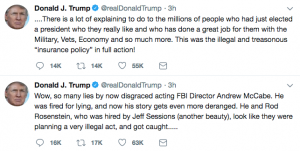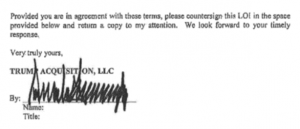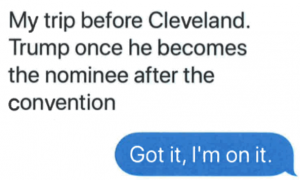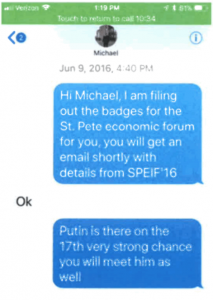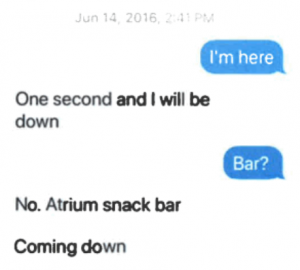NYT Continues to Tell Paul Manafort’s Lies for Him
It has been two and a half days since I pointed out that their single anonymous source — described as “a person knowledgeable about the situation” — lied to the NYT last month when it reported that Paul Manafort and Rick Gates shared poll data, “most of which was public,” “in the spring” with Konstantin Kilimnik.
Both Mr. Manafort and Rick Gates, the deputy campaign manager, transferred the data to Mr. Kilimnik in the spring of 2016 as Mr. Trump clinched the Republican presidential nomination, according to a person knowledgeable about the situation. Most of the data was public, but some of it was developed by a private polling firm working for the campaign, according to the person.
The NYT has not corrected the error and identified who turned them into a vehicle for significant propaganda.
Instead, two of the same journalists, plus Scott Shane, wrote a story they say is based on “A closer look at the transcript” focusing on the Ukrainian stuff that had already been revealed in significant detail last month.
In it, they correctly identify roughly where the beginning of the poll sharing discussion starts, but describe a lie that Manafort corrected — the same lie the NYT continues to tell — as the final testimony of Manafort.
The transcript suggests that Mr. Manafort claims that he wanted only public data transferred. But Mr. Weissmann told the judge that the question of whether any American, wittingly or unwittingly, engaged with Russians who were interfering in the election relates to “the core” of the special counsel’s inquiry.
They don’t mention that the judge, Amy Berman Jackson, Andrew Weissmann, and even Manafort’s lawyer Richard Westling, all acknowledge this was not just public polling data.
And then they present a comment by ABJ that was about Manafort’s poll sharing lies and suggest (in a story focused on the Ukraine peace deal) it generally relates to Manafort’s comments on Kilimnik.
Judge Amy Berman Jackson seemed to agree with prosecutors that whether Mr. Manafort lied about his contacts with Mr. Kilimnik was important, saying at one point, “I am, actually, particularly concerned about this particular alleged false statement.”
Because the NYT is struggling so much, as a service to them (and in hopes they expose whoever lied to them), I’m going to provide a primer on how to read redacted documents so they don’t have to continue to be a mouthpiece for Paul Manafort.
Identify How this Document Fits into the Pattern
We have a lot of tools with which to read Manafort’s breach hearing transcript, largely because it is part of a series. As I noted in my post laying out the lies NYT continues to tell, there are four prior versions of this discussion.
The hearing is a discussion about the arguments made in all these earlier documents, particularly the last two, which means we can look to them to understand what we’re seeing in the transcript.
All four discuss the same five topics. Though, as Judge Amy Berman Jackson notes, the lawyers have not remained consistent in the order in which they discuss them. (Note to Judge ABJ: I was also annoyed by that. Thanks for razzing them about it!)
This morning I’m going to organize myself by the issues the way they were numbered in the initial declaration. It was great because in every pleading, you all numbered the five issues into different orders. So I can’t really call them Issue No. 1 and Issue No. 2, but that’s the template I’m going to use. And what I’m going to do is, I’m going to hear from both sides on each issue before I move on to the next issue.
Thankfully, ABJ is more helpful at providing guideposts than the lawyers, though to clarify, when ABJ says she’s using the “initial declaration,” she’s referring to this FBI declaration, not Mueller’s original breach filing. You can tell that’s the case because it’s called a “declaration” and because it starts the same way ABJ does, with Manafort’s lies about the kickback payment.
The Structure and Content of Past Filings
To read a document that is the fifth in a series it’s helpful to map its structure and understand how that structure compares to previous iterations in the series.
I laid out the structure of the declaration ABJ says she’s following in this post. Here’s an updated version in which I’ve included some of what past documents refer to as proof and timing.
I) Kickback to/from Rebuilding America Now (0-series exhibits)
Firm A to receive 6% commission from Firm B (12/7)
After a break, it became clear that the government’s facts were incorrect – it was a $125,000 payment. (1/8 filing)
Manafort explained that it was unclear to him how this payment was recorded by his accountants and he believed the original plan was to report the payment as a loan, but that it had actually been reported as income on his 2017 tax return. The Government has indicated that Mr. Manafort’s statements about this payment are inconsistent with those of others, but the defense has not received any witness statements to support this contention. (1/8 filing)
Three false statements, first that the other people had paid him, then conflicting statements from the others (but Manafort recording the payment as income), finally that it was a loan (supported by loan documents provided at that time) (1/15 filing)
Three false statements, the last being that it was a loan
II) Konstantin Kilimnik’s role in witness tampering (100-series exhibits)
During a proffer session with the OSC on October 16, 2018, Mr. Manafort acknowledged that he and Mr. Kilimnik agreed to reach out to the witnesses. Mr. Manafort was asked to agree that Mr. Kilimnik, too, possessed the requisite state of mind to legally establish his guilt. Mr. Manafort balked at this characterization, because he did not believe he could confirm what another person’s internal thoughts or understandings were, i.e., another individual’s state of mind. (1/8 filing)
Kilimnik didn’t think he had exerted pressure (1/15 filing)
Manafort expressing Kilimnik’s views (1/23)
III) Interactions with Kilimnik (200-series exhibits)
a) Discussions of the Ukraine Peace Deal
Manafort “conceded” that he discussed or may have discussed a Ukraine peace plan with Mr. Kilimnik on more than one occasion (1/8 filing citing 12/7 one)
Issues and communications related to Ukrainian political events simply were not at the forefront of Mr. Manafort’s mind during the period at issue and it is not surprising at all that Mr. Manafort was unable to recall specific details prior to having his recollection refreshed. (1/8 filing)
Beginning August 2 and continuing until March 2018 Kilimnik and Manafort communicated about Ukraine peace plan. Three discussions were in person (1/15 filing)
Manafort freely brought up August 2 meeting, didn’t think one plan would work
1) August 2 meeting
Manafort would have given the Ukrainian peace plan more thought, had the issue not been raised during the period he was engaged with work related to the presidential (1/8)
Discussed at September 11 and 12 debriefings, then in grand jury on October 26, he admitted he saw the email (1/15 filing)
2) December 2016 meeting
Discussed September 11, September 21, October 26 (1/15)
3) Madrid meeting
Admitted it after shown evidence (12/7)
After being told that Mr. Kilimnik had traveled to Madrid on the same day that Mr. Manafort was in Madrid, Mr. Manafort “acknowledged” that he and Mr. Kilimnik met while they were both in Madrid (1/8 filing, citing 12/7 one)
September 11, 12, 13, October 26 (1/15)
Manafort lied, claimed it was about a business investment, then was shown something, and then admitted it (1/23)
4) A 2018 proposal
Not brought up prior to GJ (1/23)
b) Manafort’s false statements about sharing polling data
Email and testimonial evidence (12/7)
The same is true [he needed his memory refreshed] with regard to the Government’s allegation that Mr. Manafort lied about sharing polling data with Mr. Kilimnik related to the 2016 presidential campaign.
Evidence = interviews (plural) with gates, Gates on his access, multiple emails, on the morning of the meeting (at which Gates came late) (1/15 filing, ¶¶53-36)
Whether he told anyone to do something, SCO relies on Gates’ testimony (1/23)
IV) Another DOJ investigation (possibly that of PsyGroup or the hush payments) (300-series exhibits)
Another district (12/7)
Manafort provided the government with information pertinent to an investigation in another district prior to entering into the plea agreement in this case but then, in post-plea proffer meetings with other prosecutors not associated with the OSC, provided a different version of the same events. (1/8 filing)
One version on September 13, another on October 5, largely retracted second version; series of text messages, prior to leaving campaign (1/15)
Corrected in same interview (1/23)
V) Manafort’s contact with the Administration (400-series exhibits)
Text May 26, 2018 (12/7)
There is no support for the proposition that Mr. Manafort intentionally lied to the Government. The first alleged misstatement identified in the Special Counsel’s submission (regarding a text exchange on May 26, 2018) related to a text message from a third-party asking permission to use Mr. Manafort’s name as an introduction in the event the third-party met the President. This does not constitute outreach by Mr. Manafort to the President. The second example identified by the Special Counsel is hearsay purportedly offered by an undisclosed third party and the defense has not been provided with the statement (or any witness statements that form the basis for alleging intentional falsehoods). (1/8 filing)
May 2018 effort, targets (1/15)
Misread text messages, Gates claim (1/23)
By mapping out what the prior versions of the series look like, we can put this transcript into the structure ABJ has told us we’re dealing with, to identify with certainty which discussion is which.
The Structure of the Breach Hearing Transcript
Now we can identify the structure of this document, which will help us identify the boundaries between these parts of the discussion.
After some introductory legal discussions, ABJ teaching Andrew Weissmann how to use a microphone, and then Weissman framing why they think Manafort is a lying turd trying to get a pardon but honestly they did engage in a good faith effort to get him to cooperate, the substantive discussion starts.
ABJ tells us she is using the “way they were numbered in the initial declaration” and she’ll hear from both sides before she moves on to the next issue.
So here’s what the structure of the breach hearing looks like. Importantly, while Weissmann addresses a few issues at the beginning (which are noted), otherwise the discussions have clear start and end points, meaning we know that what appears between those start and end points pertain to the topic at hand.
I. Kickback to/from Rebuilding America Now
Start: Page 25, line 18: “With respect to the $125,000 payment by”
End: Page 47, lines 6-9
THE COURT: All right. I think you made that clear. And I think I understand everybody’s point of view about this, and what the evidence is. But, there’s some aspects of the evidence I’m going to need to re-review.
Also page 14-15, 20
II. Konstantin Kilimnik’s role in witness tampering
Start: Page 47, lines 10-12
All right. So let’s go on to what is II, or the second subject touched upon in the declaration, which is Mr. Kilimnik’s role in the obstruction conspiracy.
End: Page 63, lines 3-5
THE COURT: All right. Well, I don’t think I need any more of your telling me what it says because I’m going to read it again.
Also pages 14, 20
III. Interactions with Kilimnik
Start: Page 63, lines 5-8
So let’s go on to III, the interactions with Kilimnik, which I think I’m going to break up a little bit into the Ukraine stuff and the [polling] stuff.
a. Discussions of the Ukraine Peace Deal
Start: Page 63, lines 9-10:
With respect to the first, sort of, subtopic here, the discussions concerning the [redacted] Ukraine
End: Page 82, lines 9-13:
THE COURT: Right. But, I think what gives them cause to be theorizing is the fact that it’s described differently on different occasions, and described inconsistently with the communications between Mr. Kilimnik and Mr. Manafort, and that leads them to wonder.
b. Manafort’s false statements about sharing polling data
Start: Page 82, line 14-15:
But, I think we can go on to the question of the [polling]
End: Page 110, lines 13-17:
THE COURT: All right. I mean, when I asked you, do you want to hear from him, you said you wanted to file something. I just want to make sure you’re saying we’re done; when this record is concluded, we’re done with the record.
MR. DOWNING: Correct.
Also, pages 18-19,
IV: Another DOJ investigation
Start: Page 110, lines 20-21:
Okay. I think we can go on to category IV, the other DOJ investigation.
End: Page 121, line 18:
THE COURT: All right.
V: Manafort’s contact with the Administration
Start: Page 121, line 18-19:
Well, that leads me into No. 5, the contacts with the administration.
End: Page 132, line 5-6:
THE COURT: All right. That covers all the subject matter areas.
Validate the Model
Now it helps to make sure this model does match the prior model.
Unfortunately, the issue that NYT is perpetuating Manafort’s lies about — the sharing of polling data — is one for which we don’t have that many signposts in past filings (because this discussion is so heavily redacted). But the key dispute is clear from past filings. The government maintains the evidence includes Gates’ testimony and email evidence, while Manafort would like ABJ to believe the government is relying exclusively on Gates’ testimony.
The same is true [he needed his memory refreshed] with regard to the Government’s allegation that Mr. Manafort lied about sharing polling data with Mr. Kilimnik related to the 2016 presidential campaign.
Evidence = interviews (plural) with Gates, Gates on his access, multiple emails, on the morning of the meeting (at which Gates came late) (1/15 filing, ¶¶53-36)
Whether he told anyone to do something, SCO relies on Gates’ testimony (1/23)
Thankfully, this is a place where Weissmann’s earlier comments provide another point of validation. At the beginning, he uses the polling data as an example to refute the defense claim they had engaged in a “gotcha,” by not providing them Gates’ prior statements on the issue.
But, I wanted to address that that’s not — this is an unusual case. This is an unusual case. Not because we did that, it’s an unusual case because of the volume of evidence that the defendant had. As the Court knows, there was a trial in the Eastern District of Virginia. And as the Court knows, there was a discovery order in this case. There, the vast, vast majority of information was available to the defendant. And as one of the submissions having to do with bail conditions and — or, prison location, what’s in the record is that the defendant, on tape, in prison, says yes, he has been through all of that discovery. So, for one example of that, all of the Gates 302s that were extant in September of last year were something that had been disclosed to the defendant. So, the defendant was very well aware of what Mr. Gates had said about sharing of polling data, and that it was something that was not — not simply a matter of [redacted]. And it sort of [redacted].
In the section devoted to the topic, we see several of the things that show up earlier: Manafort ordering Gates to do something, and the reliance on Gates’ testimony.
Whether he told anyone to do something
Manafort asking Mr. Gates
[snip]
THE COURT: And because Mr. Manafort told Mr. Gates to do it?
MR. WESTLING: That’s what Mr. Gates says, yes.
THE COURT: In an e-mail.
MR. WESTLING: But I think that the e-mail says, Please print this. That’s all it says.
THE COURT: Doesn’t it say bring it to the meeting?
MR. WESTLING: I’m sorry?
THE COURT: Doesn’t it say bring it to the meeting?
MR. WESTLING: It says related to a scheduling meeting. Doesn’t say anything about a meeting with Mr. Kilimnik, it doesn’t say anything about — just on the same date.
[snip]
THE COURT: The only thing I said that corroborated his testimony about this matter was the e-mail within — related to on this date. Is that correct?
MR. DOWNING: Yes.
THE COURT: And you’re saying read more carefully, Judge, because it doesn’t say [redacted] to the meeting. So I will do that, but —
MR. DOWNING: I doesn’t say that, Your Honor —
THE COURT: — I do believe that that is corroborative.
Reliance on Gates’ testimony
they believe because Mr. Gates says so and because it’s referred to in Mr. Kilimnik’s various emails
Multiple references to whether they’ve gotten the 302s in question
Kevin Downing’s repeated attempt to suggest Gates couldn’t be credible because the jury didn’t find him credible (even while being careful to avoid having Gates testify to refute that).
Weissmann’s description of the earlier 302s they had in time for the EDVA trial.
Process New Information
Having now validated that that discussion pertains to the sharing of polling data question, we can now turn to what else new we learn in it.
There’s Weissmann’s description of Manafort telling the grand jury he understood someone was going to be sharing the data with some entity and some individual and that considered that a win-win for himself (which is why I say Manafort sold Trump out, because he figured even if this didn’t help Trump win, he would still curry favor with his Ukrainian and Russian paymasters).
which he admitted at that point was with — he understood that it was going to be given by [redacted] to the [redacted] and to Mr. [redacted], both. That from his perspective, it was — there was no downside — I’m paraphrasing — it was sort of a win-win. That there was nothing — there was no negatives.
There’s ABJ’s question about why the pollster was getting paid so much if this was no big deal.
And if that’s true, then why was [redacted] being paid so much
Westling responds by trying to argue that it’s no big deal because the data is so detailed it would be so incomprehensible to him.
This is very detailed [redacted] on a level that is very focused
Which ABJ says is why the polling data is so important.
THE COURT: But if I determine that it is established by the record and in his statement — but that’s what makes it significant and unusual.
Whereupon Westling (again, this is Manafort’s defense attorney!!!!) says that sharing data would be beneficial if it were something more public, effectively refuting the claim Manafort tried to make, which is the claim the NYT refuses to correct.
if the goal were to help Mr. Manafort’s fortunes, that some other kind of [redacted] something more public,
Then, in an effort to suggest this was just about the campaign meeting that morning, Westling says this was the most recent data.
it was the most recent, from what we can tell, the most recent
Then ABJ corrects Westling’s claims about timing, noting that Gates specifically tied this to the Havana Club meeting.
THE COURT: Didn’t he say it happened at the meeting where they had to leave by different doors and all that? Doesn’t he connect [redacted] to the meeting and the Havana Club and the coming and going
Weissmann explicitly supports this timing later in the hearing (with what seems to be a description of Manafort walking Kilimnik through what the data showed).
And then Mr. Gates, in — I think I referred you to 236, on page 3, Mr. Gates talks about the August. 2nd meeting and actually has Mr. Manafort walking Mr. Kilimnik through
And Weissmann returns to this, once again making it clear the data sharing happened on August 2.
Both of those refer to [redacted] and also refer to the discussions of the — discussions of [redacted] at the August. 2nd, 2016 meeting.
ABJ also notes there is some kind of ex parte information that she has seen that the government can’t share with the defense.
THE COURT: I need to ask the Office of Special Counsel about something ex parte because — and so I apologize for that, but I need to do that. And it may be after I talk to them, they tell me there’s no problem with sharing it with you.
This information seems to give ABJ further confidence that the government is telling the truth here.
The NYT Continues to Tell Paul Manafort’s Lies
So to repeat: both ABJ and Andrew Weissmann make it clear that on the morning of August 2, 2016, Manafort told Gates to print out some polling data. Later that day, they clandestinely meet with Konstantin Kilimnik, where they discuss both a “peace” deal in Ukraine — which Manafort admits amounts to sanctions relief — and the polling data. Indeed, Weissmann claims that Gates said Manafort walked this guy, with ties to the same Russian intelligence agency that was still hacking Hillary Clinton, through that very complex and recent polling data.
And the fact that the data was so complex, according to ABJ, is “what makes it significant and unusual.” Indeed, even Manafort’s own lawyer suggests this is not public information, which is one of the things he tries to argue would suggest Manafort wasn’t trying to benefit himself.
When the NYT says this:
The transcript suggests that Mr. Manafort claims that he wanted only public data transferred. But Mr. Weissmann told the judge that the question of whether any American, wittingly or unwittingly, engaged with Russians who were interfering in the election relates to “the core” of the special counsel’s inquiry.
They are not telling their readers that Richard Westling, in an attempt to defend Manafort, made it very clear this was not public data.
And when the NYT suggests that this comment pertains to Manafort’s interactions with Kilimnik generally,
Judge Amy Berman Jackson seemed to agree with prosecutors that whether Mr. Manafort lied about his contacts with Mr. Kilimnik was important, saying at one point, “I am, actually, particularly concerned about this particular alleged false statement.”
They need to acknowledge that the comment comes from a paragraph (on page 103, the section exclusively dedicated to a discussion of the polling data) that focuses on the defense effort to discredit Gates’ polling data testimony by claiming they hadn’t gotten his 302s from January 2018.
THE COURT: All right. So, whether we need to have a hearing on that because I am, actually, particularly concerned about this particular alleged false statement. But I also think we need to think about what the purposes I’m being asked to find whether or not this is, what the burdens are, etcetera. So, you’re entitled to think about it, although I don’t think this has come as a surprise, that this was the issue, since this was the only evidence they pointed to as the fact that this fact was false, was Mr. Gates’s 302s and the e-mail.
Manafort doesn’t want this public because he knows it’ll kill his chance for a pardon
Here’s why I just wasted so much time trying to teach the NYT to read (aside from the fact that the NYT probably “corrected” a story that was initially correct, that this data got shared with Oleg Deripaska, which is made more obvious once you stop telling the lie that the data got shared in the spring).
This is an area where Weissmann specifically suggests Manafort was lying last fall to sustain his chance for a pardon.
the other motive that Mr. Manafort could have, which is to at least augment his chances for a pardon.
Paul Manafort doesn’t want the public to know he gave highly detailed polling data to a GRU-tied Russian, Konstantin Kilimnik, at a clandestine meeting he may have flown home from on Oleg Deripaska’s plane. He doesn’t want the public to know that because it’ll kill his chance for a pardon.
And for some unfathomable reason, the NYT doesn’t appear to want the public to know that, either.
As I disclosed last July, I provided information to the FBI on issues related to the Mueller investigation, so I’m going to include disclosure statements on Mueller investigation posts from here on out. I will include the disclosure whether or not the stuff I shared with the FBI pertains to the subject of the post.
